
Adolph Green was an American lyricist and playwright who, with long-time collaborator Betty Comden, penned the screenplays and songs for musicals on Broadway and in Hollywood. Although they were not a romantic couple, they shared a unique comic genius and sophisticated wit that enabled them to forge a six-decade-long partnership. They received numerous accolades including four Tony Awards and nominations for two Academy Awards and a Grammy Award. Green was inducted into the Songwriters Hall of Fame in 1980 and American Theatre Hall of Fame in 1981. Comden and Green received the Kennedy Center Honor in 1991.
This is a list of notable events in music that took place in the year 1941.
This is a list of notable events in music that took place in the year 1910.

Oscar Levant was an American concert pianist, composer, conductor, author, radio game show panelist, television talk show host, comedian, and actor. He had roles in the films Rhapsody in Blue (1945), The Barkleys of Broadway (1949), An American in Paris (1951), and The Band Wagon (1953). He was awarded a star on the Hollywood Walk of Fame in 1960 for recordings featuring his piano performances. He was portrayed by Sean Hayes in the Broadway play Good Night, Oscar, written by Doug Wright. Levant appeared as himself in the Gershwin biopic Rhapsody in Blue (1945).

For the Boys is a 1991 American musical comedy-drama film that traces the life of Dixie Leonard, a 1940s actress/singer who teams up with Eddie Sparks, a famous performer, to entertain American troops.

Moon Over Miami is a 1941 American musical comedy film directed by Walter Lang with Betty Grable and Don Ameche in leading roles and co-starring Robert Cummings, Carole Landis, Jack Haley and Charlotte Greenwood. It was adapted from the play by Stephen Powys. This was previously adapted into a 1938 film titled Three Blind Mice directed by William A. Seiter and starring Loretta Young, Joel McCrea and David Niven
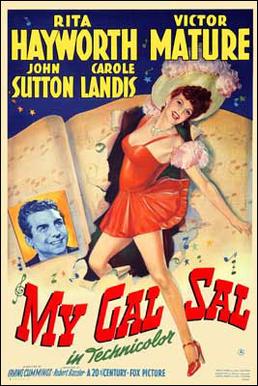
My Gal Sal is a 1942 American musical film distributed by 20th Century Fox and starring Rita Hayworth and Victor Mature. The film is a biopic of 1890s German-American composer / songwriter Paul Dresser and singer Sally Elliot. It was based on a biographical essay, sometimes erroneously referred to as a book, by Dresser's younger brother, novelist Theodore Dreiser. Some of the songs portrayed as Dresser's work were actually written by him, but several others were created in the 1890s style for the film by the Hollywood songwriting team of Ralph Rainger and Leo Robin.

Oscar Shaw was a stage and screen actor and singer, remembered primarily today for his role as Bob Adams in the first film starring the Marx Brothers, The Cocoanuts (1929). United States census records show that Shaw was already working as a stage actor in 1910, while still living with his mother, brother, and stepfather.

Carmel Valentine is a fictional character from the British Channel 4 soap opera Hollyoaks, played by Gemma Merna. She debuted on-screen during episodes airing on 22 August 2006 and was introduced by series producer Bryan Kirkwood as part of the McQueen family. Carmel has proved popular with fans with her comedic personality and has become notable for her "dumb blonde" appearance. Carmel was killed-off as she saved her cousin, Theresa McQueen from Sonny Valentine during the "End of the Line" storyline. Her most prominent storylines include her marriage and divorce from Sonny's brother Calvin Valentine, her facial disfigurement after a tanning machine explodes in her face, remarrying Calvin which ends in tragedy after he was shot dead by Theresa, her relationship with Jim McGinn, her feud with Theresa and infatuation with Theresa and Calvin's daughter Kathleen-Angel McQueen, beginning a relationship with Sonny and being killed in an explosion following a train crash at her cousin Porsche McQueen's wedding reception.
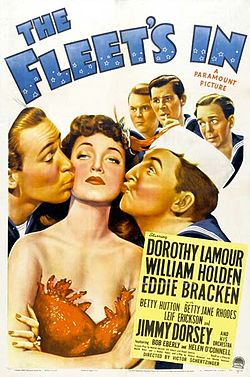
The Fleet's In is a 1942 movie musical produced by Paramount Pictures, directed by Victor Schertzinger, and starring Dorothy Lamour and William Holden. Although sharing the title of the 1928 Paramount film starring Clara Bow and Jack Oakie, it was not a remake. It was actually the second film version of the 1933 Kenyon Nicholson–Charles Robinson stage play Sailor, Beware!, enlivened with songs by Schertzinger and lyricist Johnny Mercer. The score, under the musical direction of Victor Young, includes the popular hits "Tangerine", and "I Remember You".

Cindy Williams is a fictional character from the British soap opera Hollyoaks, played by Stephanie Waring. She made her first on-screen appearance on 13 November 1995, originally played by Laura Crossley, as the youngest daughter of Gordon and Angela Cunningham. A year after her first appearance, Crossley quit the serial later that year and the role was recast to Waring who appeared from November 1996 to November 2000. Waring reprised the role briefly in 2002 and 2004 before returning as a full-time character in June 2008, reintroduced by series producer Bryan Kirkwood. In 2010, the character was temporarily written out for Waring's maternity leave. She returned to filming in January 2011 and returned to screens on 9 March 2011.
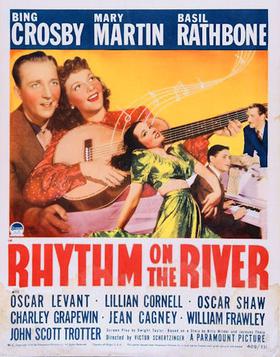
Rhythm on the River is a 1940 American musical comedy film directed by Victor Schertzinger and starring Bing Crosby and Mary Martin as ghostwriters whose songs are credited to a composer played by Basil Rathbone. Crosby and Martin sang "Only Forever", for which James V. Monaco (music) and Johnny Burke (lyrics) were nominated for the Academy Award for Best Original Song.
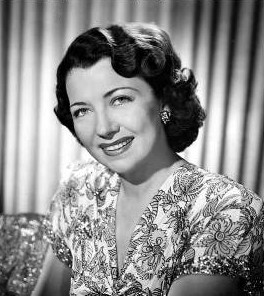
Barbara Jo Allen was an American actress. She was also known as Vera Vague, the spinster character she created and portrayed on radio and in films during the 1940s and 1950s. She based the character on a woman she had seen delivering a PTA literature lecture in a confused manner. As Vague, she popularized the catchphrase "You dear boy!"
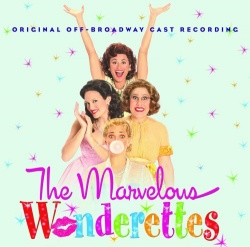
The Marvelous Wonderettes is a jukebox musical comedy with a book by Roger Bean. The show, which uses pop songs from the 1950s and 1960s as a vehicle to tell its story, pays homage to the high school Songleader squads of the 50s. When called upon to perform at their senior prom as a last minute replacement, Springfield High Songleaders Betty Jean, Cindy Lou, Missy and Suzy, rally together to entertain their classmates in four-part harmony. The second act shows the four ten years later at a high school reunion.

The McQueen family is a fictional family in the Channel 4 soap opera Hollyoaks. The family first appeared in 2006 and the family have been involved in a number of the show's most high-profile storylines, most notably John Paul McQueen's affair with Craig Dean ; Jacqui McQueen's whirlwind relationship with Tony Hutchinson ; Myra McQueen's long-lost son Niall Rafferty's revenge on his family by holding them hostage in an abandoned church and blowing it up, ultimately killing his half-sister Tina Reilly ; Theresa McQueen's pregnancy by her cousin Carmel McQueen's fiancé Calvin Valentine and later shooting him dead on their wedding day; Mercedes McQueen's affair with her fiancé Riley Costello's father Carl ; being kidnapped by Riley's grandfather Silas Blissett, Jacqui coping with the death of her husband Rhys Ashworth in a bus crash, learning that he had been having an affair with Cindy Cunningham and that he got Sinead O'Connor pregnant; Mercedes stalking Mitzeee and stabbing herself and framing her; Carmel's facial disfigurement; Myra faking her own death to escape her daughter Mercedes' evil husband, Dr. Paul Browning ; Mercedes killing her husband Doctor Browning by striking him over the head with a shovel; John Paul's male rape at the hands of his pupil Finn O'Connor ; the train crash which ultimately killed Carmel; Mercedes faking her death to help Grace Black get revenge on Freddie Roscoe ; Theresa donating her kidney to Nico Blake ; Porsche and Cleo McQueen's sexual abuse at the hands of their mother Reenie McQueen's fiancé Pete Buchanan ; Phoebe McQueen's murder in hospital by the Gloved Hand Killer; the stillbirth of Mercedes' baby Gabriel; John Paul's transgender boss Sally St. Claire being revealed as his biological father, Mercedes being framed for drugs by Joanne Cardsley, Celine McQueen and Diego Salvador Martinez Hernandez De La Cruz's sham wedding for money; Celine being murdered by her ex-boyfriend and serial killer Cameron Campbell after discover he causes the fire at the fair on Halloween 2016; Hunter affair with his teacher Neeta Kaur, leads his feud with his fiance Mac Nightingale ; Prince marriage to Lily Drinkwell and Breda turning out to be a serial killer.

Red, Hot and Blue is a 1949 American musical comedy film directed by John Farrow and starring Betty Hutton, Victor Mature, William Demarest and June Havoc. It was released by Paramount Pictures. Hutton plays an actress who gets mixed up with gangsters and murder. Frank Loesser wrote the songs and plays a key role. The film has no connection to Cole Porter's play of the same name.
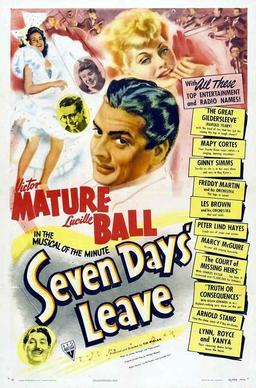
Seven Days' Leave is a 1942 musical comedy about a soldier who has seven days to marry an heiress in order to inherit $100,000.
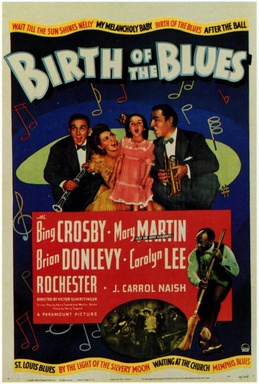
Birth of the Blues is a 1941 American musical film directed by Victor Schertzinger and starring Bing Crosby, Mary Martin and Brian Donlevy.
















